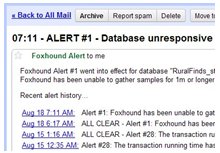

|
Foxhound is the better* Database Monitor for SQL Anywhere.
*better: More thorough, more relevant, more effective.
...more Alerts, more All Clears, more details, more control in your hands.
|
| [Home] | [Table of Contents] | [Previous Section] | [Next Section] |
Breck Carter
Last modified: February 12, 1998
mail to: bcarter@bcarter.com
If a primary key, a UNIQUE NOT NULL index or a UNIQUE constraint (which does not allow nulls) do not exist for a table then UPDATE and DELETE statements must log all columns instead of just the key and updated columns. This can slow things down and inflate the size of the log file.
Even if you don't need a primary key for reasons of referential integrity or query optimization it still might be a good idea to define one. Figure 11 shows that an UPDATE statement runs faster if the table has a primary key, regardless of the database cache size.
Figure 11 - Primary Key Speeds Update
|
| [Home] | [Table of Contents] | [Previous Section] | [Next Section] |